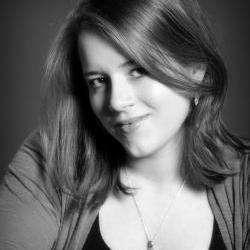Composed for the consecration of the new Coventry Cathedral in 1962, Benjamin Britten’s War Requiem is a monumental setting of the words of the Latin Mass, interspersed with the poignant poetry of Wilfred Owen. Due to the large forces involved – there is not only a full symphony orchestra, large choir and three soloists, but a chamber orchestra and off-stage boys choir – the piece receives fewer complete performances than it might do, so tonight was an unusual treat for the packed audience at the Royal Festival Hall gathered to hear the London Philharmonic Orchestra perform the work with conductor Vladimir Jurowski.
Coventry Cathedral itself is an interesting inspiration for a musical work, as it was bombed by the Luftwaffe in the air raids of 1940 before being rebuilt filled with beautiful, modern stained-glass windows within the remains of the old cathedral complex, creating an intriguing mix of old and new, with an astonishing acoustic. Britten’s requiem reflects this juxtaposition with the religious text and war poetry counterbalancing each other in emotional and religious weight. The text is also musically juxtaposed, with the choir and soprano soloist taking the Latin text, accompanied by the orchestra and the Owen poetry narrated by the tenor and baritone soloists, which have their own chamber orchestra accompaniment. Often this is performed from within the main orchestra, but tonight the chamber orchestral were physically separate from the main instrumental group, which I thought worked well in the space. The boys’ choir, with its own young soloist, provides a third dimension to the work, and all three are displayed to great effect in the first movement, Requiem aeternam. Unfortunately the Royal Festival Hall is unsuited to using an off-stage choir as you would in a church context, when there tend to be organ lofts and galleries to utilise, so the young choir were placed outside the auditorium somewhere and were barely audible. The solo boy was even more lost in the acoustic; despite sounding rather angelic from afar, the impact was somewhat lost to the audience.
The singers on stage, however, were present and always communicative, with Ian Bostridge’s beautifully clear tenor enunciating each and every word of the wonderful text with extraordinary clarity. Matthais Goerne had the slight disadvantage of singing in a foreign language, but although the text was occasionally lost, the emotion behind the words was always clear and he had a wonderful tone, making for some magical moments, such as the quote from the Canticles in the Abraham and Isaac setting. The chamber orchestra were equally magical in their support of these heart-rending passages. Due to illness, tonight’s soprano was a last minute stand in, which was, on the whole, amazingly solid and seemingly calm and collected. There were moments of unease, but the top notes soared over the choir and orchestra with ease.
The whole work is an emotionally charged rollercoaster, and tonight’s performance had some of the epic nature that must have been experienced at the first performance – the total silence at the end of the performance was testament to the emotional journey we experienced and the rapturous applause was well deserved.


